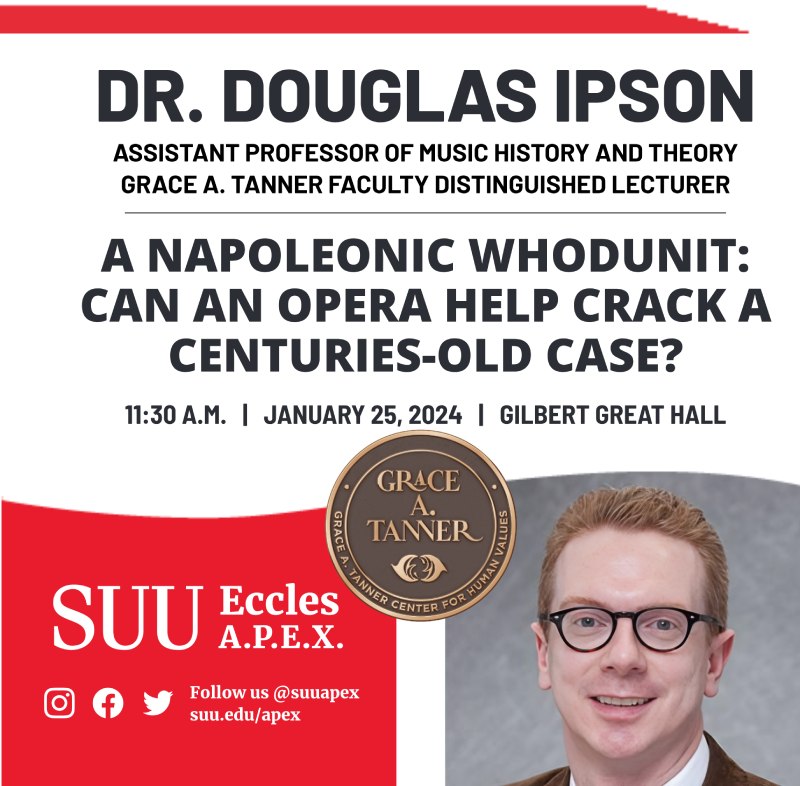
Dr. Douglas Ipson
January 25, 2024
The Great Hall
Grace A. Tanner Faculty Distinguished Lecturer, Dr. Douglas Ipson as he presents "A Napoleonic Whodunit: Can an Opera Help Crack a Centuries-Old Case?"
On Friday, 10 October 1800, a ragtag group of artists and Jacobins were arrested at the Paris Opera, accused of plotting to stab First Consul Napoleon Bonaparte in his box. In the coming weeks the suspected ringleaders of this so-called Conspiracy of Daggers were swiftly tried, convicted, and guillotined as a warning to other would-be assassins. But how guilty were they? Although the regime prosecuted its case confidently, its critics from the beginning insisted that the accused were little more than patsies goaded into the crime by an undercover agent. Drawing on a wide range of sources—including official proceedings, firsthand accounts, architectural plans, secret British intelligence reports, as well as letters and scores in the French National Library and the Paris Opera archives—this lecture reopens the case and argues that the “conspiracy” was likely an elaborate set-up by the authorities and that the opera performed on that fateful evening played a key role in entrapping and foiling the assassins.
Douglas L. Ipson is Assistant Professor of Music History and Theory at Southern Utah University. He received a Ph.D. in music history at the University of Chicago after earning bachelor’s and master’s degrees in music from Brigham Young University. A specialist in nineteenth-century Italian opera—especially its political aspects—he has been published in the Cambridge Opera Journal and is a contributor to The Cambridge Verdi Encyclopedia (2013). He is preparing the critical edition of the opera La battaglia di Legnano for The Works of Giuseppe Verdi, published by the University of Chicago Press and Casa Ricordi. His other areas of scholarly interest include Shakespeare and opera, the sixteenth-century Italian madrigal, and opera in revolutionary and Napoleonic France. He is also a composer and arranger whose works have performed across the United States and internationally. He is a native of St. George, Utah.
Synopsis
Looking Back at a Moment at the Opera
By: Christina Schweiss
The Ask. Ponder. Educate. [X]. event on Jan. 25 featured Southern Utah University professor Douglas Ipson. His presentation was called ‘A Napoleonic Whodunit: Can an Opera Help Crack a Centuries-old case?’
Ipson explained that on Oct. 10, 1800, Napoleon Bonaparte was almost ambushed and assassinated while he was attending an opera at the Paris Opera House. However, many scholars believe that this is just a conspiracy.
The opera which Bonaparte was attending was called Les Horaces. During the opera, there is a scene where three brothers are to give an oath, saying that they will fight for their country. Ipson explained that the oath scene is also based upon a painting called ‘Oath of Horatii.’ This scene was going to be where the attack took place.
The plan of attack was to stab Bonaparte using daggers, and then start a fire in the opera house. If that would have happened, the National Library, which was just across the street from the opera house, would have gone up in flames. Fortunately for the library (and Bonaparte), the assassination attempt was prevented by the police force of Joseph Fouché, who was the former Minister of the police of France.
Many records from that time don’t include this specific night at the opera. However, in his memoir, Fouché affirmed that a plot arose aiming at assassinating Napoleon at the opera house.
Ipson said that the reason this story is questioned so much is because the story of the attempted assassination is based upon “oral history rather than documented history.”
Ipson ended his lecture by mentioning how scholars and historians believe this story to be a conspiracy since there are not too many records of it. However, based on his research, Ipson does not believe the story can be entirely discounted.
“Nothing seems all that far fetched,” said Ipson.
Video
Podcast
Songs
- A Horse with No Name - America
- La Donna è mobile - Luciano Pavarotti
- I Could Have Danced All Night - From the musical My Fair Lady Performed by Julie Andrews
- Haydn, Symphony no. 88, fourth movement, Finale: Allegro con spirito - Performed by New York Philharmonic










